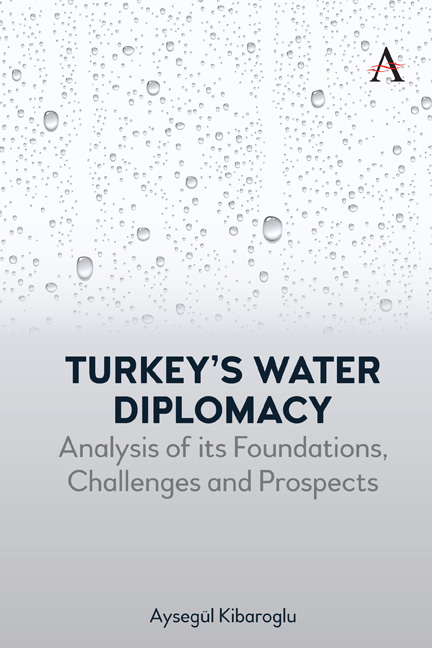Book contents
- Frontmatter
- Contents
- Acknowledgements
- List of Abbreviations
- Introduction
- 1 Institutional Setting
- 2 Water Diplomacy Principles
- 3 Turkey’s Evolving Position vis-à-vis International Water Law
- 4 The Role of History and Geography in Turkey’s Evolving Water Diplomacy
- 5 Analyzing Non-State Actors and Processes in Turkey’s Water Diplomacy Framework
- Conclusion
- References
- Index
- Frontmatter
- Contents
- Acknowledgements
- List of Abbreviations
- Introduction
- 1 Institutional Setting
- 2 Water Diplomacy Principles
- 3 Turkey’s Evolving Position vis-à-vis International Water Law
- 4 The Role of History and Geography in Turkey’s Evolving Water Diplomacy
- 5 Analyzing Non-State Actors and Processes in Turkey’s Water Diplomacy Framework
- Conclusion
- References
- Index
Summary
This book presents the main institutions and the principles of Turkey's water diplomacy framework. All through the book, the chapters dwell upon and highlight the specific role of the Euphrates–Tigris (ET) river basin in developing water diplomacy principles as well as shaping Turkey's stance vis-à-vis the international water law. One key finding of the book is that Turkey's water diplomacy framework embodies clearly identifiable, well-established formal state institutions. Thus, as Figure 1 demonstrates, the Ministry of Foreign Affairs (MFA) constitutes the central node of water diplomacy institutional framework. In the same vein, the MFA leads the systematic bureaucratic collaboration with water line ministries and relevant institutions, namely the State Hydraulic Works (DSI) and the Ministry of Agriculture and Forestry (former MFWA and MEF). Those state institutions, which are generally responsible for the development, management and preservation of water resources have worked closely with the MFA in the formulation of the fundamental principles of water diplomacy. Moreover, the concerned state institutions that are responsible for different aspects of water policy and management have been diversified in the early 2000s. Thus, the General Directorate of Water Management and the Turkish Water Institute (SUEN) have contributed to water diplomacy discourses and practices under the Ministry of Agriculture and Forestry. Furthermore, as the water diplomacy policies and practices expanded towards new dimensions, like ‘humanitarian water diplomacy’, DSI and other state institutions, such as Turkish Cooperation and Coordination Agency (TIKA) and Disaster and Emergency Management Presidency (AFAD) as well, have been integrated into Turkey's water diplomacy institutional framework.
Another observation on Turkey's water diplomacy framework entangles the peculiarity of the ET river basin in the formation of water diplomacy institutions and principles. In this context, transboundary (Joint Technical Committee) as well as national (Southeastern Anatolia Project Regional Development Administration (GAP RDA)) institutions are delineated as integral components of institution-building in water diplomacy framework.
The role of non-state actors or informal institutions in transboundary water policymaking is still minimal even though there is ample room to involve them in water diplomacy in particular, with an objective to communicate more effectively across a wide spectrum of scientific disciplines, policymaking bodies and practitioners, and also to strive for integrated approaches to tackle the complex issues like transboundary water cooperation in conflict-laden regions, such as the downstream riparians of the ET river basin.
- Type
- Chapter
- Information
- Turkey's Water DiplomacyAnalysis of its Foundations, Challenges and Prospects, pp. 143 - 148Publisher: Anthem PressPrint publication year: 2021

